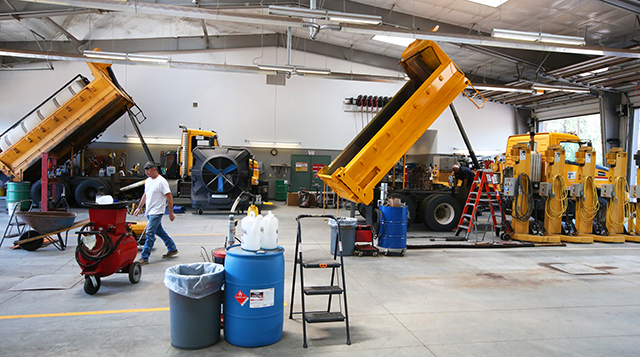U.S. and China will rekindle trade talks
Published 12:00 am Saturday, August 18, 2018
WASHINGTON — The United States and China will return to the negotiating table late this month in an attempt to ease months of tensions that have been building since trade talks broke down this year and both countries began imposing escalating rounds of tariffs on each other.
China said that it would send a delegation led by Wang Shouwen, its vice minister of commerce, to Washington to meet with a group of officials led by David Malpass, the Treasury Department’s undersecretary for international affairs.
Trending
Although Trump administration officials have repeatedly said the ball is in China’s court to revive the faltering discussions, the Chinese government said the trip was being made at the invitation of the United States.
The talks come as the trade relationship between the two countries faces further deterioration.
The Trump administration is preparing far more expansive tariff measures, including levies on another $16 billion worth of Chinese products that are expected to go into effect.
The administration is also scheduled to hold six days of hearings over the next two weeks to allow up to 370 witnesses to weigh in on plans for tariffs on a further $200 billion worth of Chinese products, a spokeswoman for the U.S. trade representative said.
If those tariffs go into effect, the United States would be taxing roughly half the goods it imports from China each year, raising prices for a broad swath of manufacturers, retailers and other industries.
The meeting between midlevel officials is a departure from the formal rounds of talks between top economic teams from the United States and China that took place during the early days of the Trump administration and the trade meetings led by Treasury Secretary Steven Mnuchin and Liu He, China’s vice premier in charge of economic policy, this spring.
Trending
Larry Kudlow, the director of the White House’s National Economic Council, sought to lower expectations Thursday and insisted that President Donald Trump had no intention of backing down on his demands.
“Any time you’re talking, that’s better than not talking,” Kudlow said in an interview with CNBC.
Kudlow said that the demands of the United States have not changed, and that China must lower its tariff and nontariff barriers and cease the theft of U.S. intellectual property.
“The Chinese government in its totality must not underestimate President Trump’s toughness and willingness to continue this battle,” Kudlow added.
Beyond tariffs, currency concerns have re-emerged as an issue in the Trump administration, and they are expected to come up during this round of talks.
The value of China’s currency, the renminbi, has fallen roughly 10 percent against the dollar since the beginning of April, a change that makes Chinese products cheaper for foreigners to purchase and helps offset the impact of the Trump administration’s tariffs.
Economists say the currency has weakened because of market forces and the strengthening of the dollar, as well as the influence of the Chinese government, which sets a baseline for the currency and then allows its value to fluctuate within a narrow band.
That drop in value will put pressure on the Treasury Department before an October report in which Mnuchin is charged with deciding whether to label countries currency manipulators. So far, the Trump administration has declined to give China the label, saying that while China manipulated its currency in the past, that problem had dissipated for now.
But in the past month, China’s currency has once again become a target for Trump.
“China, the European Union and others have been manipulating their currencies and interest rates lower, while the U.S. is raising rates while the dollars gets stronger and stronger with each passing day — taking away our big competitive edge,” Trump tweeted on July 20. “As usual, not a level playing field …”
In its coming talks, the Treasury Department will seek to pressure the Chinese to lift the value of their currency, a person briefed on the plans said. But additional U.S. tariff measures going into effect in coming months could further push down the value of the renminbi against the dollar, complicating those efforts.
The Trump administration is engaged in trade clashes on multiple fronts, as U.S. negotiators seek to wrap up talks over the North American Free Trade Agreement with Canada and Mexico and hold additional talks with European and Japanese counterparts in coming months.
In the meantime, talks with China have moved slowly. The White House has seemed unimpressed by China’s offers to purchase tens of billions of dollars’ worth of additional U.S. products, which Trump administration trade officials say fall short of the substantial changes they want China to make to its partly state-run economy.
Trade experts were skeptical Thursday that the coming talks would prove fruitful. Chinese officials have expressed frustration that the United States has not empowered a point person in the trade talks who can speak on behalf of Trump. In May, after Mnuchin announced that the trade war was “on hold,” the president scrapped the agreement that the countries were working toward and called for more tariffs.
Malpass is even less empowered than Mnuchin to strike a deal, and while the Treasury Department has been the agency most aggressively pushing for a trade truce, the Office of the U.S. Trade Representative, led by Robert E. Lighthizer, is formally charged with overseeing the lists of Chinese goods facing tariffs.
At the Group of 20 summit meeting of finance ministers in Argentina last month, Mnuchin said that he had engaged only in “chitchat” with his Chinese counterparts and that the ball was in China’s court to initiate a breakthrough.
“This looks like it will be a waste of time for the two govts,” Scott Kennedy, director of the Project on Chinese Business and Political Economy at the Center for Strategic and International Studies, wrote on Twitter. “Who thinks US Treasury Dept is empowered to make THE deal to end the trade war?”








